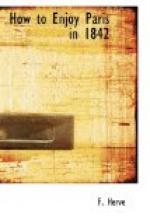Having observed a number of persons assembled on the Boulevards, I asked the cause, and was told that some cavalry was expected to pass in a few minutes, for which the people were waiting. I took my station amongst them, which happened to be next to two bakers’ boys, who were in earnest conversation, when I was edified by the following observations. “Do you know why Alphonse left his place?” “Yes,” replied the other, “because his master gave him a cuff on the head.” “That certainly was a very great indignity;” observed the younger; “to receive a blow is very humiliating.” “That is true,” replied the other, “but figure to yourself the folly of a lad, for the sake of a paltry thump, to sacrifice all his future prospects; in a few years, had he put up with the insult, he might have been head man in a bakehouse in the Rue St. Denis, which is one of the most populous quarters in Paris.” “True,” said the younger, “it would have been wiser to have sayed; but when excited, reason does not always come to one’s aid.”
I have translated the discourse as literally as I could, that I might preserve as nearly as possible the expressions which the boys used, as it has often struck me how much more refined they are, than those to which lads of the same age and class would have had recourse in England.
Some of the scenes at the tribunals are very amusing; I remember a very rough ferocious-looking man having been brought up for returning to Paris, from which he had been sent away on account of some offences which he had committed, and was ordered to some small obscure town in the provinces, under surveillance. Finding his banishment very irksome, an irresistible impulse brought him back to Paris, and repairing to his old haunts, he sought the Rue de la Mortellerie, which had in part been pulled down, on account of some improvements which were going forward; whilst he was gaping about, looking in vain for his dear Rue de la Mortellerie, he was recognised by a Serjeant of police and very unwillingly lodged in the Corps de Garde (guard-house), and brought before the Tribunal of Correction; he was interrogated as to his having dared, in defiance of the law, to return to Paris. He replied, “indeed, Monsieur le President, I was so overcome with ennui, that I found it impossible to exist there any longer; now, only imagine for an instant, M. le President, the idea of a Parisian, as I am, to be sent to a little bit of a place where there was no theatre, no promenade, not even a public monument.”




